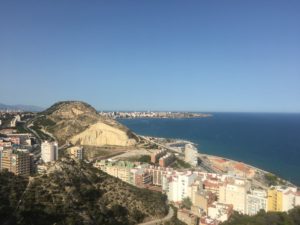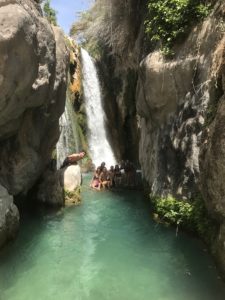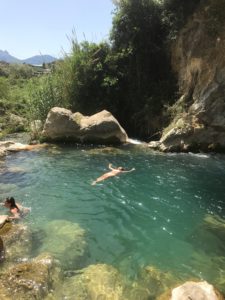I can’t believe it – it is already the last week of my stay in Alicante! In so many ways, I feel as if I just arrived. When I told my host family that my flight leaves Saturday morning, in just six days, they were visibly shocked—my mamá thought I had another week! With this realization, we have come up with a list of things we have not gotten around to doing: on Wednesday, I am teaching them how to make chocolate chip cookies; on Thursday, we are playing our last tennis match; on Friday, we are going to their favorite restaurant. My host mother also lamented that she hasn’t made me her special brownies, or taken me to hike up a nearby mountain they love, so we decided that I have to return and then we can complete these tasks too.
The end is approaching quickly, and I have so many mixed feelings about my departure. In many ways, I miss my life in the United States; I, of course, miss my family and friends, and could not be more thrilled to see them, but I miss some little things too, things I hadn’t appreciated at home before living in Spain, like free water, air conditioning, and big cups of coffee! On the other hand, there are so many people and places here that have made my experience so great, and that I cannot imagine saying ¡adios! to already. Obviously, at the top of this list is my host family. They have been so generous, kind, and simply fun. I will miss my mamá’s sweet smile every time she checked on me, my papá’s endless dad jokes, the little sister I never had asking me for advice, and playing tennis with my brother. I hope this will not be goodbye forever, because I have truly grown to appreciate and love this wonderful family as my own.
I will miss the city itself, too—its sandy beaches, its history, its energy. Not a day has gone by that I haven’t admired my surroundings on my morning walk to the tram with a deep sense of awe and gratitude.
Finally, I will miss the language. Though I knew I had a passion for Spanish before arriving, I was embarrassed by my lack of skills; I was struggling to keep up, and hesitant to talk. Now, after so much practice and rapid advancement throughout the past several weeks, I absolutely love listening and speaking this beautiful, challenging, exciting language. I am no longer scared to contribute or make a mistake. On the contrary, I will gladly make mistakes if it means I will be corrected and improve further. While, of course, I will continue taking demanding Spanish classes at Notre Dame, that setting can never compare to being completely immersed in the language. I am already exploring my options for more Spanish language development next summer. 🙂



